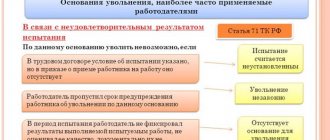Reasons for dismissal
Termination of an employment contract with a convicted specialist who, according to a court verdict, can no longer perform the functions assigned to him, is carried out in accordance with paragraph 4 of part 1 of Article 83 of the Labor Code of the Russian Federation (hereinafter referred to as the Labor Code of the Russian Federation). To do this, the following criteria must be met:
- the person has been sentenced to punishment;
- the criminal penalty does not allow you to continue working;
- the judge's decision entered into legal force.
Important
Thus, until the court verdict enters into legal force, determined by Article 390 of the Code of Criminal Procedure of the Russian Federation, the convicted person cannot be dismissed. Also, the absence of an employee from work as a result of being in custody cannot be qualified as a disciplinary offense. This period should be regarded as a valid factor for absenteeism.
In this regard, the employer should receive, through a request from the court office, a certified copy of the determination in relation to a specific worker. In case of conviction to punishment, the performance of previous work, the contract with him can be terminated. Among these punishments:
- arrest (Article 54 of the Criminal Code of the Russian Federation);
- imprisonment for a specific period, up to life (Articles 56 and 57 of the Criminal Code of the Russian Federation);
- loss of the opportunity to carry out specific types of activities (Article 47 of the Criminal Code of the Russian Federation).
For these reasons, when an employee is in custody for the period of investigation or awaiting determination of the type of punishment, actions for his dismissal can be started “at his own request”, by persuading him to draw up such a statement.
In what cases is it possible to dismiss an employee who has been sentenced to punishment by a court verdict?
You need to dismiss an employee who has been sentenced to punishment if the sentence has entered into legal force and the employee’s further continuation of work is impossible (for example, he is deprived of his liberty). We will explain further on what grounds for dismissal in this case.
In some cases, you can dismiss an employee who has been sentenced to punishment by a court verdict, even if the punishment does not preclude the possibility of him continuing to work (for example, if he is given a suspended sentence). We will talk about such cases below.
On what grounds to dismiss an employee if the punishment imposed by a court verdict excludes the possibility of continuing work
If a court verdict has been passed against an employee, which excludes the possibility of continuing work, then we recommend dismissing the employee under clause 4, part 1, art. 83 of the Labor Code of the Russian Federation - in connection with a conviction to punishment that precludes the continuation of previous work, in accordance with a court verdict that has entered into legal force. Such dismissal is the most risk-free, since it does not depend on the will of the parties and is carried out on the basis of a court verdict.
But you can choose another basis for dismissing an employee in the following cases:
- if he is punished for committing theft of someone else's property, embezzlement, intentional destruction or damage at his place of work, you can fire the employee under paragraphs. "g" clause 6, part 1, art. 81 Labor Code of the Russian Federation;
- If an employee directly servicing monetary (commodity) assets is punished for committing guilty actions that give rise to the loss of your trust in him, dismissal is possible under clause 7, part 1, art. 81 Labor Code of the Russian Federation.
In both the first case and the second (provided that the employee has committed guilty actions that give rise to loss of trust, at the place of work and in connection with the performance of job duties), you will have to follow the procedure for bringing the employee to disciplinary liability for failure to fulfill the employee’s official duties. In particular, you need to request a written explanation from him, which is usually difficult to do in this situation (part 3 of article 192, part 1 of article 193 of the Labor Code of the Russian Federation, paragraph 1 of paragraph 47 of the Resolution of the Plenum of the Supreme Court of the Russian Federation dated 17.03 .2004 N 2);
- if the employee is sentenced to punishment, in the presence of which the law restricts his right to engage in his previous work activity. For example, if a teacher is convicted of a crime against life and health, you can fire him under clause 13, part 1, art. 83 of the Labor Code of the Russian Federation - “the emergence of restrictions on engaging in certain types of labor activity established by the Labor Code of the Russian Federation, other federal law and excluding the possibility of an employee fulfilling obligations under an employment contract.”
This is due to the fact that such an employee does not have the right to engage in teaching activities if he has a criminal record for such a crime (paragraph 3, part 2, article 331, part 1, article 351.1 of the Labor Code of the Russian Federation). But in this case, he will first have to offer a transfer to other suitable vacancies in accordance with Part 2 of Art. 83 Labor Code of the Russian Federation. Therefore, if the punishment is associated, for example, with imprisonment, it is better to dismiss the employee under clause 4, part 1, art. 83 Labor Code of the Russian Federation.
Is it possible to dismiss a convicted employee in connection with a punishment that does not exclude the possibility of continuing to work?
Yes, it is possible if the law provides for a special reason for dismissal, for example:
- if an employee is punished for committing theft of someone else’s property, embezzlement, intentional destruction or damage at the place of work (under paragraph “d”, paragraph 6, part 1, article 81 of the Labor Code of the Russian Federation). To dismiss, you need to follow the procedure for bringing disciplinary liability, in particular: ask the employee for a written explanation, if after two working days he does not provide it, draw up a report about this (part 3 of article 192, part 1 of article 193 of the Labor Code RF);
- if the employee directly services monetary (commodity) valuables and is punished for committing guilty actions that give rise to a loss of confidence in him on the part of the employer (under clause 7, part 1, article 81 of the Labor Code of the Russian Federation). To dismiss on this basis, you need to follow the above procedure only if the employee committed guilty actions, as a result of which your trust was lost, at the place of work and in connection with the performance of job duties (part 3 of article 192 of the Labor Code of the Russian Federation, paragraph 1 p 47 Resolution of the Plenum of the Supreme Court of the Russian Federation dated March 17, 2004 No. 2).
In addition, a situation is possible where the sentence as a whole does not exclude the possibility of continuing to work, but the employee is deprived by the sentence of a special right that he needs to perform his job duties. For example, the driver is deprived of the right to drive a vehicle.
In this case, you will have to fire the employee under clause 9, part 1, art. 83 of the Labor Code of the Russian Federation, that is, in connection with the deprivation of a special right, if you do not have other vacancies suitable for the employee or he refused the transfer (Part 2 of Article 83 of the Labor Code of the Russian Federation).
Legal aspects
The Criminal Code of the Russian Federation states that a criminal record is considered to be temporary or lifelong penalties provided for a person who has violated the law. If a person has a criminal record, their rights are limited, and in some cases a permanent ban on certain types of activities is established.
Termination of employment relations with a person serving a prison sentence is carried out under the fourth paragraph of Art. 83.1 of the Labor Code, about which a corresponding note is made in the work book. But dismissal will be lawful only after the court verdict enters into legal force, since until a decision is made in a criminal case, a person is officially considered innocent.
If the employee has not yet been convicted, but has simply been subject to a restriction in the form of temporary isolation (i.e., detention) for the period of the preliminary investigation, there are no grounds for dismissal under the mentioned article, but the accrual of wages is suspended during the investigation. At the same time, if the suspect was subsequently acquitted, the period of his stay in the pre-trial detention center is included in his work experience, since there was a good reason for his absence from work.
When a suspended sentence is imposed, the dismissal of a convicted employee is possible in cases where the committed act is incompatible with the continuation of work, casts a shadow on the professional qualities of the person, or has a direct connection with his job responsibilities. These nuances are described in the relevant paragraphs of Art. 81.1 of the Labor Code, which should motivate the termination of employment relations after the court verdict enters into legal force.
If a decision on the case has not yet been made, but the employee is in custody, he cannot be dismissed due to a disciplinary violation - this action is unlawful and can be appealed in court in the future.
Labor relations with an employee sentenced to correctional labor should be terminated under Articles 78 and 80 of the Labor Code, if there is written permission from the executive inspectorate. Other dismissal options will be considered a violation of the Labor Code.
Grounds for dismissal
According to the Criminal Code of the Russian Federation, a criminal record is taken to mean all measures that are taken to punish a person for certain illegal actions and that change his legal status. The Criminal Code of the Russian Federation states that the dismissal of a convicted employee must be carried out regardless of the opinions and preferences of the parties.
The regulation of termination of work in a company is regulated by Article 83, paragraph 4 of Article 1, in order to carry out actions to conclude a contract, the following conditions must be met:
- Entry into force of the order according to the official conclusion of the court.
- Taking into custody a person for the period established by the sentence, who is currently registered with the enterprise.
- Deprivation of this citizen, in accordance with the law, of the right to hold this position.
Work book entry form
In such a situation, you should not rush to fire the worker. A suspended sentence, as a rule, does not exclude the possibility of performing work at the previous place. Among the reasons for dismissal, such a basis is not provided for in Articles 81 and 83 of the national labor legislation.
For your information
In the Labor Code of the Russian Federation, the legislator assigned such a right to the employer only if a person commits a crime related to official powers. These include acts provided for in Articles 285, 286 of the Criminal Code of the Russian Federation and some other offenses.
The employer has the same opportunity if a specialist commits an act that discredits a certain profession or field in which the person is employed.
In accordance with paragraph 5.4 of the Instructions for filling out work books, ratified by Resolution of the Ministry of Labor of Russia No. 69 of October 10, 2003, in the event of termination of the employment relationship for reasons beyond the will of the parties, an entry in the work book is made with a reference to Article 83 of the Labor Code of the Russian Federation.
“The employment contract was terminated due to the employee being sentenced to punishment, precluding the continuation of his previous work, in accordance with the court verdict that entered into legal force, paragraph 4 of part 1 of Article 83 of the Labor Code of the Russian Federation.”
For your information
Upon termination of work as a result of the impossibility, by a court decision, to subsequently occupy certain positions or engage in a specific type of activity, the following is entered into the labor report: for how long, on what basis and what position the employee is deprived of the right to occupy.
It is possible to dismiss an employee who has been sent to prison only if there is a document confirming the legality of the enterprise’s actions, so the first thing the employer should do to terminate the employment relationship is to request a copy of the conviction.
After the necessary papers are received, the procedure is formalized in accordance with current legislation, namely:
- The company issues an order UV T-8 to dismiss the employee. The last working day should be considered the date the court decision entered into legal force (in some cases, the last day on which the convicted person performed official duties).
- A note is made in the work book about the termination of the employment contract due to circumstances beyond the control of the parties on the basis of clause 4 of Art. 83.1 Labor Code of the Russian Federation. The entry is made in strict accordance with the wording of the said article and is accompanied by a link to the latter. In the line “Base (document, number, date)” you should refer to the court verdict. The order must contain a note stating that it is not possible to familiarize the employee with the order.
- The organization sends a notification to the prisoner’s home address with a request to pick up the work book. An employee can draw up a power of attorney for a specific person, transferring to the latter the right to receive a TC, or express a desire to receive a book by mail by writing an application.
- The employer makes the necessary calculations and provides the convicted person with all required payments (wages, bonuses, vacation compensation). Money can be transferred to a bank card or given to a trusted person. The latter may be the enterprise itself - in this case, the funds will be transferred to the employee after release.
Basic provisions
According to paragraph 10 of Art. 77 of the Labor Code of the Russian Federation, an employee can be dismissed due to the occurrence of circumstances independent of the will of the parties.
The legislator enshrined the relevant grounds in Art. 83 Labor Code of the Russian Federation. One of these is the termination of a contract due to the commission of a criminal offense by the worker. Provided that the court imposed a punishment that is an insurmountable obstacle to the continuation of the labor relationship. This could be:
- imprisonment regardless of how long the person is sentenced to;
- arrest, that is, isolation of a person from society. It is installed in accordance with Art. 54 of the Criminal Code of the Russian Federation for up to six months. It is possible to settle an employee in such a situation if the contract with him expires before the end of the arrest;
- deprivation of the right to engage in certain professional activities, hold positions in the civil service or in local government. In this case, in the sentence the court must indicate what specific activities the convicted person cannot engage in and for how long;
- life imprisonment.
It must be taken into account that dismissing an employee under clause 4 of Art. 83 of the Labor Code of the Russian Federation is possible only when such punishment is implemented. In this case, two conditions must be met:
- the punishment chosen by the court must prevent the further continuation of the employment relationship;
- The court verdict must necessarily come into force, since before that it can be appealed. If an employee of an enterprise is in the status of a suspect or is serving an administrative arrest, then the employer cannot legally dismiss him on his own initiative. Such termination of the contract may have adverse consequences for the employer.
Thus, if the court applied a punishment against a person that does not exclude the possibility of him performing his work duties, then dismiss him under clause 4 of Art. 83 of the Labor Code of the Russian Federation will not be possible.
For example, if corrective labor was prescribed under Art. 50 of the Labor Code of the Russian Federation, then the convicted person will serve them at the main place of employment. At the same time, a certain percentage of the employee’s earnings will be transferred to the state budget.
By the way , a convicted employee can freely resign of his own free will.
Employees who are under investigation and cannot perform their work duties are not paid. If a subordinate falls ill while in custody, he will also not be paid temporary disability benefits.
In the event that a person, at the request of the investigator, was temporarily suspended from work by the court, he, in accordance with paragraph 6 of Art. 114 of the Code of Criminal Procedure of the Russian Federation, has the right, on the basis of a court ruling, to receive benefits the amount of which is equal to the subsistence minimum, which is expressly stated in paragraph 8 of Art. 131 Code of Criminal Procedure of the Russian Federation.
After the court decision comes into force, the employer should not delay the dismissal of the convicted employee. It is important to remember that paying a subordinate in this case is not a right, but an obligation of the enterprise administration.
Let's take a closer look at how to properly fire a convicted employee.
Dismissal by court decision
Separately, it is worth mentioning the case when an employee is sentenced to a punishment that deprives him of the right to continue his previous activities. In this situation, the organization not only has the right to dismiss him from his position, but is obliged to do this within three days from the date of receipt of a copy of the court decision and notification of the criminal executive authorities. Dismissal should take place as follows:
- After receiving the mentioned papers, the termination of the contract is formalized on the basis of the fourth paragraph of Art. 83.1 Labor Code of the Russian Federation. At the same time, notes about the date and reason for dismissal are made in the work book and card of the UV T-2 employee. The day of termination of employment should be considered the last day on which the employee performed official duties.
- Documentary evidence of the execution of the court decision is prepared.
- A notice that the requirements of the sentence have been met is sent to the enforcement authority along with a copy of the dismissal order and other supporting information (if necessary).
The algorithm for terminating an employment contract with an employee after his conviction is generally simple, however, each specific situation may have its own nuances, therefore, if the manager has doubts about making a decision, he should consult with a lawyer.
Procedure
When an organization receives a corresponding letter from the judicial authorities about the entry into force of a court verdict, the following procedure occurs:
- First, you quickly need to draw up a document that will indicate the termination of the employment contract with the enterprise specialist. 3 days are given for the document to be fully prepared and come into force.
- Next, the employer must prepare documents that prove the fulfillment of a legal obligation.
- The next step, on behalf of the company, is a notification sent to the enforcement authority, which corresponds to the execution of the court verdict. Also, therefore, law enforcement authorities have the right to demand from the company copies of the following documents:
- Order to dismiss a convicted employee.
- Entry in your personal file and supporting documents.
- An entry is made into the work book, and payments are made.
Important
It is worth clarifying that if a worker is absent from the place of work in an enterprise while under investigation, the employer cannot consider a disciplinary violation as the reason. This is due to the fact that being under investigation by the authorities is a valid reason for absence.
Also, if the sentence includes the performance of corrective labor, then during the period the completion of work in the organization can be done by agreement of the parties or the worker’s own statement, and the manager does not have the right to do this.
Suspension from work of a convicted person for a real sentence
The obvious punishment associated with actual deprivation of liberty excludes the possibility of the worker working in his position. With such a convicted person, the right to terminate the contract is secured by law if:
- the citizen is sent to prison, a specialized colony;
- a person is deprived of the right to hold certain positions or perform specific activities.
The date of dismissal from work of such a specialist will be considered the day when the employee last performed his job duties.
The procedure for dismissing a convicted person
When a decision is received from the judiciary to bring an employee to criminal liability, precluding further work activity, the employer is obliged to perform the following actions:
- within 3 days, in accordance with Article 83 of the Labor Code of the Russian Federation, terminate employment relations with the convicted person by issuing an appropriate order in the T-8 form;
- prepare a comprehensive package of papers on the implementation of these operations, including filling out a personal card and work book accordingly;
- notify judicial enforcement units about compliance with the requirements of the judge's verdict. If necessary, submit to these authorities the indicated order for the dismissal of the employee and other necessary papers for the convicted person;
- upon dismissal of a former employee, provide the person with a work book.
The dismissal order must include:
- information about the employing organization;
- date and registration number of the paper;
- information about the dismissed person (position, full name and other data);
- a judge's verdict is the basis for termination of an employment agreement;
- information about the manager who signed the order, with a “live” signature and a full indication of the position.
For your information
It should be taken into account that it may not always be possible to acquaint an employee sent to serve a sentence in a prison or colony with the order in person and issue him a work book. In this regard, a corresponding note is made in the order, and the papers can be transferred to another person who has a notarized power of attorney to carry out actions on behalf of the convicted person.
Also, at the request of a person sentenced to punishment, a work book can be sent to their specified address.
Cash payments to a convicted person upon dismissal
In the event of the dismissal of a citizen who is unable to continue working due to criminal liability, the employer must issue the person:
- patch;
- compensation for days of unused vacation;
- premium.
The amount of payment is calculated for actual workdays. During the period of detention, if the employee was on the staff of the organization, no money is accrued. Funds can be issued on the day of dismissal:
- by cashless payment by transfer to a bank card;
- in cash - no later than the next day after settlement.
Cash can be transferred to the principal of the convicted person, who is required to have the appropriate power of attorney. According to Art. 185.1 of the Civil Code of the Russian Federation, the head of the colony has the right to certify powers of attorney for persons staying in institutions of the Federal Penitentiary Service of the Russian Federation. The principal can also be the employer, who will return the funds after serving the sentence.
Dismissal of a convicted person
During the operation of any company, cases often arise when one of the employees is held criminally liable for a crime committed. As a result, the worker is unable to fulfill assigned duties due to serving a sentence in prison, as well as the presence of certain restrictions on rights by court decision.
In this case, the employer has the right to terminate the employment relationship with such employee. But the convicted person must be dismissed strictly in compliance with all legal norms.









